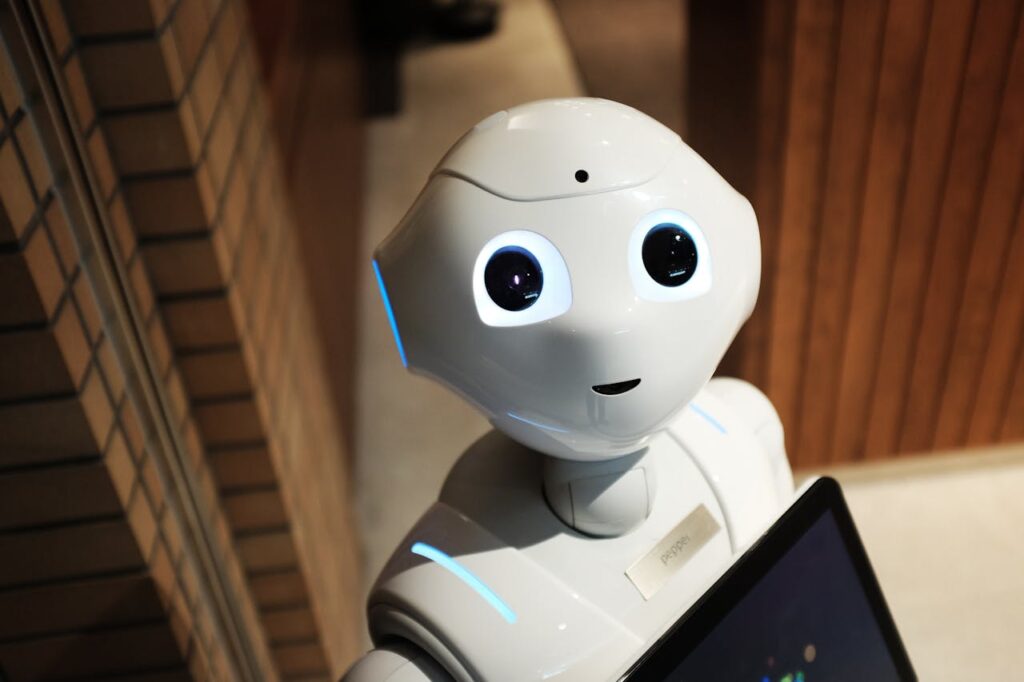The Rise of Artificial Intelligence and Its Future
In several industries as well, including healthcare, finance, etc., the applications of Artificial Intelligence (AI) have already revolutionized the various processes of automation, decision-making, and user experiences, as well. However, the story does not stop here. Due to the trend as we approach the year 2025, artificial intelligence will only get more advanced and will present new opportunities to innovate, be creative, and be efficient in any field.
This article is going to discuss what is coming next in AI, which are those innovations that will change artificial intelligence into another level. We are going to examine how AI will further change industries, our workforce and society in general; including AI-powered automation and discover the future of healthcare.
1. AI-Powered Automation: Transforming Industries

Automation is one of the areas that artificial intelligence has always been concentrated on and in 2025, automation with the help of artificial intelligence will become even more incorporated into the industries all over the world. Although there are already a few processes that AI has already automated, in the future people are likely to see massive transformations in industries that used to be highly dependant on human work. Ai will make all things work faster in terms of manufacturing, customer care, reduce costs, and make everything efficient.
AI in Manufacturing
In the manufacturing industry, AI will be very instrumental in smart factories where the robots as well as machines can work independently on more complex tasks. By 2025, the machines which are driven by AI will be able to adjust to the changing production conditions and minimize downtime, waste and boost the accuracy of production. AI-driven predictive maintenance will stop the breakdown of machines even before they can. This will improve the uptime and efficiency of the manufacturers.
AI in Customer Service
AI-powered chat-bots and virtual assistants are in customer service now, and their functionality will go on advancing. AI will enable companies to deliver hyper-personalization customer experience by leveraging real-time analysis, predictive customer needs and real-time assistance. Anticipate AI to engage in complex projects of customer interaction, which previously could be closed only by human agents, with higher customer satisfaction and less spend of resources on their operations.
Automation enabled by AI will pretty much transform the labor force. By removing manual operations and automating them on the way towards more strategic workforce activities, the organizations will be in a position to drive the businesses to become both more lean and agile in the digital era.
2. AI in Healthcare: Revolutionizing Medicine and Treatment

Nothing will happen to the health sector. Artificial intelligence will be at the forefront of bringing a huge change here. By 2025, a lot of AI will be integrated into the medical environments and absolutely transform the way diseases were diagnosed, treated, and prevented. AI promises a revolution in the healthcare system to make it more effective, successful in making doctors treat more patients in a cost-efficient manner, and subsequently, improve their patient outcomes as well.
AI-Powered Diagnostics
AI will improve the chances of deriving proper diseases faster and precisely. Artificial intelligence can scan medical-related data, including medical images, genetic information and patient histories, much more efficiently than other existing techniques by using machine learning algorithms. The earlier diseases such as cancer, heart related disorders, neurological disorders will be detected the better the prognosis and survival statistics.
Personalized Medicine with AI
The personalized medicine will also involve AI where a treatment plan will be customized on the individual level to the patient life history, lifestyle, and genetic makeup. AI will support the development of a new era of precision medicine in the future by assisting in the development of more personalized treatment solutions, which are more effective and with fewer side effects. When AI is applied in genomics, it will enable researchers to discover novel drug targets and medicines, which will open the door to paradigm-shift technology in the form of gene-editing tools, like CRISPR.
3. AI and Autonomous Vehicles: Redefining Transportation

Another sphere where the future of AI is bright is autonomous vehicles. New transport networks will transform how we travel, transport products, and manage traffic as self-driving cars, trucks and drones are developed. The autonomous vehicles that are driven by AI are expected to gain popularity by the year 2025, and this will come with numerous advantages to consumers, industries, and cities.
Self-Driving Cars: The Future of Mobility
Self-driving cars powered by AI will increase safety, traffic flow and reduce emissions. Autonomous vehicles will have the potential to adjust to the road conditions, route change in the moment, and reduce driving errors caused by human imparities through the help of AI-based decision-making technique. The evolution of autonomous vehicles will revolutionize urban transportation, providing a chance to create cleverer, more efficient yet cost-effective transportation systems that will rely on highly reliable and affordable vehicles.
AI in Delivery and Logistics
Besides using AI in personal transport, it will automate logistics and delivery. The autonomous delivery automobiles and drones can bust through streets and deliver with more pace and effectiveness compared to the ones that are driven by humans. This will help in decreasing the delivery times and costs as well as advancing the total productivity of the logistics industry.
4. AI and Ethics: Addressing the Challenges of AI Integration

Ethics will become a factor that becomes more significant in the use of AI technology as it keeps improving. Since AI is applied in such sensitive spheres as healthcare, law enforcement, and hiring, the problem of bias, transparency, and accountability should be solved to guarantee the responsible use of AI technologies.
Mitigating Bias in AI
Bias in decision-making algorithms is one of the largest ethical issues of AI. When the AI systems learn using past data, they may end up repeating historic prejudices within realms like employment, credit rating, and policing. Bias elimination and making AI systems fair and equitable will be the approach to responsible AI creation in the future.
Accountability and Transparency in AI
Accountability and transparency will arise as the focal areas of ethics as AI systems become more autonomous. Whose fault is it when AI system errs? What could we do to make sure that the decisions made by AI are transparent? In the future, there will be an impetus to design ethical standards and regulations that will safeguard the purpose of using AI in a way that is beneficial to society and that has the least amount of risks.
5. AI and the Workforce: Shaping the Future of Jobs

The emergence of AI will cause a radical shift to the labour market. Although AI has the promise of increasing productivity and efficiency, it will also result in automation of most of the tasks that were previously done by people. Nevertheless, new employment possibilities will also arise with the introduction of AI, particularly, new occupations within the area of AI development, data science and robotics.
Job Automation and Job Creation
AI is expected to replace more routine, repetitive jobs in such spheres as manufacturing, customer service, and transportation by 2025. This will help in relieving human workers to do more strategic, creative, and complex jobs. Although the replacement of jobs will become a concern, new job profiles will also emerge in which skills in AI management, machine learning, and data analysis will be required.
AI and Worker Augmentation
AI is unlikely to become a separate alternative to human workers, but more frequently represent an instrument of human enhancement. The tools based on AI will help workers make their decisions faster and more informed and will make them more efficient at completing complex tasks. The applications of the AI will witness a considerable increase in such industries as healthcare, finance, and education as a way to supplement and augment human labor.
The Future of Artificial Intelligence Is Just Beginning
The future of the Artificial Intelligence is extremely bright. The use of AI in automation, innovating healthcare, creating autonomous cars, and dealing with ethical issues that are bound to arise, AI is going to reshape our world in a significant manner. By 2025 AI will not only transform industries, but will also transform the essence of work, innovation, and human connection.
As much as the future beckoning might be challenging, particularly as far as ethical considerations and the transformation of the workforce are concerned, the advantages of AI are inexhaustible. In the future, AI integration will play an essential role in solving some of the greatest problems of our times and making opportunities that will allow us to have a smarter, more efficient, and more equitable future.
Stay updated on the latest advancements in AI and emerging technologies by subscribing to our newsletter. Get expert insights, news, and discussions on how AI will shape the future!



